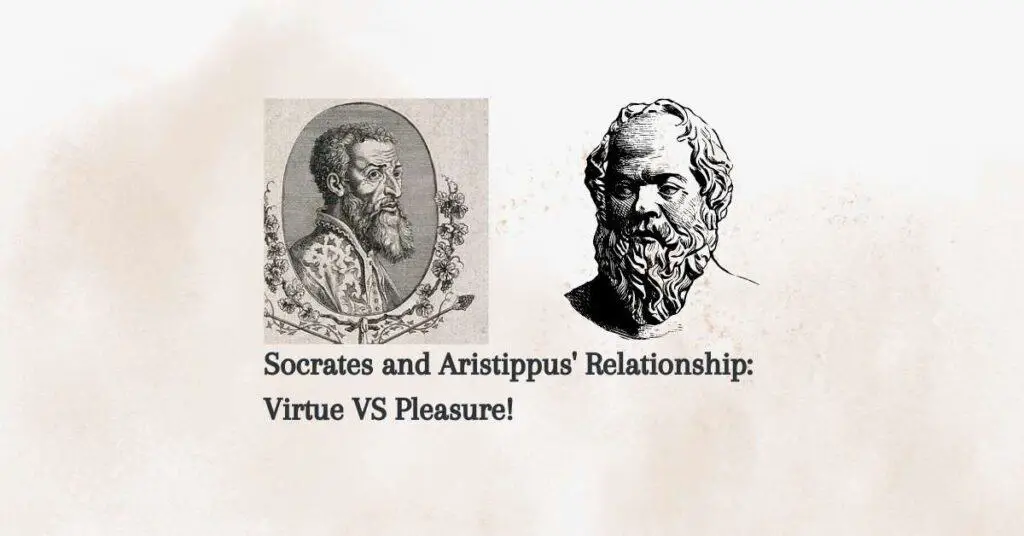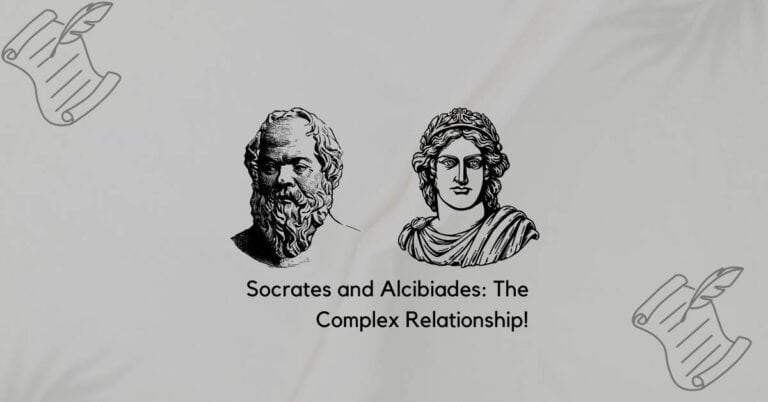Socrates and Aristippus’ Relationship: Virtue VS Pleasure!
Socrates and Aristippus’s relationship is a prime example of how students can forge their paths, even when studying under a legendary teacher like Socrates.
Socrates, the gadfly of Athens, famously focused on virtue and knowledge. His student, Aristippus, however, became known for advocating pleasure as the ultimate good.
This blog will analyze Socrates and Aristippus’ relationship, exploring how their time together shaped their contrasting philosophies.
We’ll crack open some ancient Greek knowledge and see how their ideas diverged, sparking debates that continue today.
Did Socrates try to mold Aristippus into his virtuous ideal? Did Aristippus drag Socrates to hedonistic parties? (Probably not on that last one.)
Before diving into the big questions, let’s learn about our two philosophers today.
Background of Socrates and Aristippus: A Brief Overview
-
Socrates:
Have you ever heard the phrase “know thyself”? That nugget of wisdom comes straight from Socrates. This Athenian teacher of Aristippus lived around 400 BC.
He wasn’t like your typical teacher. He didn’t lecture or hand out dusty scrolls. Instead, Socrates was a gadfly—constantly buzzing around Athens, pestering people with questions to get them thinking critically about life’s big issues.
We don’t have any writings by Socrates himself—crazy, right? However, his students preserved his ideas, especially those of the famous Plato. So, what did Socrates teach?
Socrates believed that the unexamined life wasn’t worth living. He wasn’t interested in gossip or trivia. He wanted people to think deeply about important stuff like:
- What is actual knowledge?
- What does it mean to be good?
- How should we live our lives?
- The Socratic Method: Turning Up the Dial on Thinking
Socrates had a unique teaching style called the Socratic Method. Imagine a conversation where you don’t get spoon-fed answers.
Instead, Socrates would ask you a series of questions, like a philosophical game of ping-pong. By poking holes in your initial ideas and challenging your assumptions, he’d guide you to discover your knowledge.
The Socratic Method revolutionized philosophy. It showed that questioning, not just accepting what you’re told, is crucial for finding the truth. This questioning spirit laid the foundation for all Western philosophy that followed.
So, next time you’re pondering life’s big questions, you can thank Socrates for getting the “critical thinking” ball rolling.
-
Aristippus:
Now, let’s shift gears and meet Socrates’ student, Aristippus. Unlike Socrates, who was all about virtue and the good life, Aristippus was the champion of pleasure.
We know he hailed from Cyrene, a city in North Africa known for, well, let’s say, a love of pleasure. Maybe that rubbed off on him?
- Cyrenaic Hedonism: All About the Feels
Aristippus founded the Cyrenaic school of philosophy, and their motto could have been “Pleasure is King!”
They believed that the only good thing in life is pleasure, and the only bad thing is pain. Unlike some hedonists who focus on long-term happiness, the Cyrenaics were all about maximizing pleasure in the moment.
Think delicious food, good company, and a comfy nap under the olive trees. Here are some critical ideas of Aristippus’ Cyrenaic philosophy:
- Pleasure Now: Forget delayed gratification – grab the good feels while you can!
- Body Over Mind: Physical pleasures were a top priority for the Cyrenaics.
- Master of Your Domain: They believed in finding pleasure in any situation and adapting to your circumstances instead of letting them control you.
In the next section, we’ll explore the fascinating (and sometimes conflicting) relationship between Socrates and Aristippus and see how their contrasting ideas continue to spark debate today.
The beginning of Socrates and Aristippus’s Relationship:
So, how did Aristippus end up studying with the virtue-focused Socrates? Historians believe a few things might have drawn him in:
- Socrates’ Fame: Socrates was the hottest name in Athenian philosophy. Maybe Aristippus, like many others, was curious about this guy who challenged everyone with his questions.
- The Power of Dialogue: Socrates’ way of teaching, the Socratic Method, wasn’t just about lectures. It was a dynamic conversation, and some scholars believe Aristippus might have been drawn to this interactive approach.
There’s also a story, mentioned by Diogenes Laërtius (a biographer of ancient philosophers), that describes Aristippus’ attraction to Socrates’ ideas as “violent.” Now, “violent” might sound a bit dramatic, but it could mean Aristippus was intensely captivated by Socrates’ approach, even if he didn’t fully agree with his conclusions.
Were Socrates and Aristippus good friends?
Probably not. Socrates was known for being a bit prickly, and Aristippus enjoyed the finer things in life. Their personalities might not have meshed perfectly.
According to Xenophon, Socrates tried to get Aristippus to be more moderate about enjoying things like wine, hanging out with women, and eating a lot. But, sadly, Aristippus and his followers disagreed with Socrates’ advice.
Virtue vs. Pleasure: Philosophical Divergence between Socrates and Aristippus
Socrates and Aristippus, teacher and student, ended up on opposite ends of the philosophical spectrum. Let’s break down the core of their contrasting ideas:
Socrates: The Virtue Champion
For Socrates, the ultimate goal in life wasn’t pleasure but living a virtuous life. Here’s the breakdown:
- Virtue is Key: Socrates believed that true happiness comes from living virtuously. This meant things like courage, justice, wisdom, and temperance. Basically, being a good person overall.
- Knowledge is Power: To live virtuously, you need knowledge. Socrates encouraged people to constantly question and examine their beliefs to truly understand what’s right and good.
- The Examined Life: He believed in constant self-reflection and striving to be the best version of yourself.
Aristippus: The Pleasure Seeker
Aristippus, on the other hand, saw pleasure as the ultimate good. Here’s his hedonistic philosophy:
- Pleasure Above All: For Aristippus, pleasure is the only good thing in life, and pain is the only wrong thing.
- Seize the Moment: Forget delayed gratification! The Cyrenaics believed in maximizing pleasure in the present moment. Delicious food, good company, a comfortable nap – these were the good things in life.
- Body Over Mind: Unlike some philosophers who focused on intellectual pursuits, the Cyrenaics believed physical pleasures were king.
So, while Socrates was all about the long game – building a virtuous character for a fulfilling life – Aristippus was the champion of living for the moment and soaking up all the sensory delights he could.
Key differences between their views:
Socrates |
Aristippus |
Virtue is the ultimate good |
Pleasure is the ultimate good |
Knowledge is key to living a good life |
Focus on maximizing pleasure in the present moment |
Encourages constant self-reflection |
Less emphasis on intellectual pursuits |
Focuses on moral character |
Focuses on physical pleasures |
A Complex Dynamic: Did Pleasure and Virtue Collide?
Socrates and Aristippus’ relationship goes beyond a simple teacher-student dynamic. Their contrasting views on the good life raise intriguing questions:
Did Socrates Try to Convert Aristippus?
Some scholars do believe that Socrates likely challenged Aristippus’ focus on pleasure. There’s even a story (source: Xenophon’s “Memorabilia”) where Socrates questions Aristippus about the importance of self-control, even in the pursuit of pleasure. He uses the analogy of someone being overpowered by lust, likening it to animals being trapped by their desires.
This suggests Socrates might have tried to nudge Aristippus towards a more balanced approach, incorporating virtue and self-control alongside pleasure.
Did Aristippus Live a Life of Excess?
Aristippus was known for enjoying the finer things. He charged for his teachings (unlike Socrates) and reportedly lived a life of luxury. He even had a relationship with Lais, a famous courtesan in Ancient Greece.
- This lifestyle might seem contradictory to Socrates’ teachings, but there’s a key point to consider. Aristippus, according to his philosophy, believed in adapting to circumstances and finding pleasure even in less-than-ideal situations. So, maybe for him, enjoying luxury and the company of Lais wasn’t indulgence but simply maximizing pleasure in the context of his life.
- Whether Socrates disapproved of Aristippus’ choices remains a mystery. However, their contrasting approaches highlight the ongoing philosophical debate: Can you have both pleasure and virtue? Or do they ultimately clash?
- In the next section, we’ll see how their relationship and ideas continue to influence philosophical discussions even today.
A Legacy of Divergence: How Socrates and Aristippus Shaped Philosophy
The relationship between Socrates and Aristippus wasn’t just a quirky anecdote from ancient Greece. It left a lasting mark on philosophy:
From Student to Founder: The Cyrenaic School
Aristippus didn’t simply parrot Socrates’ ideas. He took the seed of questioning and, thanks to his focus on pleasure, founded the Cyrenaic school of philosophy. This school challenged the dominant focus on virtue and sparked debates about the nature of happiness and the role of pleasure in a good life.
The Power of Contrasting Ideas
Socrates and Aristippus’ contrasting views became a cornerstone of philosophical discourse. Their debate about virtue vs. pleasure continues to this day. Here’s how their ideas influenced later thinkers:
- Epicureanism: This philosophy, founded by Epicurus, took inspiration from Aristippus’ focus on pleasure. However, Epicurus emphasized a more moderate approach, prioritizing long-term happiness over fleeting pleasures.
- Utilitarianism: This school of thought, developed much later, also grapples with the concept of pleasure. Utilitarians believe the best actions are those that maximize pleasure for the greatest number of people.
The Teacher, the Student, and the Ongoing Debate
Socrates and Aristippus’ relationship is a testament to the power of intellectual exchange. Even with contrasting views, they challenged each other’s ideas, sparking debates that continue to shape philosophy today.
So, the next time you ponder the good life, whether you prioritize virtue or savoring the moment, remember Socrates and Aristippus. Their clash of ideas reminds us that the pursuit of wisdom and happiness is a never-ending journey.
Final Thoughts:
Socrates and Aristippus’ relationship wasn’t your typical teacher-student duo. Socrates, the champion of virtue, and Aristippus, the pleasure seeker, represented opposite ends of the philosophical spectrum.
Key Points Recap:
- Socrates focused on living a virtuous life, while Aristippus saw pleasure as the ultimate good.
- Their contrasting views – virtue vs. pleasure – sparked debates that continue to this day.
- While details are scarce, Socrates likely challenged Aristippus’ ideas, while Aristippus’ lifestyle might have seemed contradictory to some.
A Lasting Impact
Despite their differences, their relationship played a crucial role in the development of philosophy:
- Aristippus founded the Cyrenaic school, challenging the dominant focus on virtue and sparking debates about happiness and pleasure.
- Their contrasting ideas influenced later thinkers like Epicurus and the development of Utilitarianism.
Conclusion
Socrates and Aristippus’ relationship reminds us that the pursuit of wisdom and happiness is a journey with multiple paths. Their contrasting philosophies serve as a springboard for our own exploration of the good life, whether we prioritize virtue, pleasure, or a healthy balance of both.



